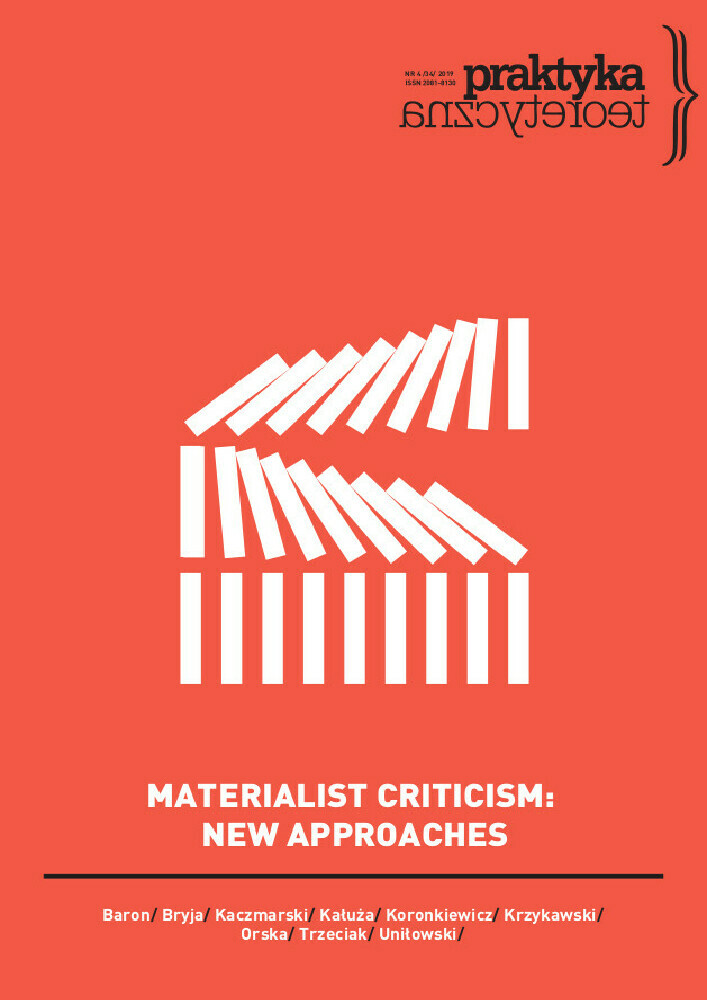Abstract
The goal of this essay is twofold: firstly, it is a description a post-critical tendency within the contemporary, Anglo-American humanities; secondly, it presents propositions which broaden the boundaries current in the post-critical current, which lead to the replacement of critical sci-entificity with an affirmation of everyday readerly affects. The claims regarding the rejection of a criticism based on suspicion, formulated by, among others, Rita Felski, accentuate the elite character of reading, the goal of which is the unveiling of the economico- political entan-glement of the text as a product of historical reality. The distrust towards the surface of the text and the illusion of aesthetic autonomy, central for cultural studies, raised the critical atti-tude to the rank of an activity that is revelatory and privileged. The opponents of an unmask-ing criticism underline its limitations—unmasking reveals the ultimate source of every cultural production, the logic of capitalism, the total character of which leaves no chance for change. In defense of change, and in the hope of restoring to literature a widespread interest, there appear tendencies which bring back the individual experience of reading, the basis of which is to be aesthetic pleasure, freed from the historical context and its determinants. In the article, examples of such tendencies will be pointed out, as also will be their consequences caused by the elevation and universalisation of non-professional reading. The rejection of the political task of criticism leads to the questioning of its anti-systemic potential; in turn, the apotheosis of suspicion paralyses the postulative dimension of criticism. For this reason, in the last part of the essay, I propose going beyond oppositional con ceptualisations in the direction of a criti-cism that is situated and material, and whose model, in my rendering, is subordi nated knowledge.
References
Althusser, Louis, and Etienne Balibar. 1970. Reading Capital. Trans. Ben Brewster. London: NLB.
Armstrong, Isobel. 2000. The Radical Aesthetic. Oxford: Blackwell Publishers, 2000.
Bordwell, David. 1991. Making Meaning: Inference and Rhetoric in the Interpretation of Cinema. Cambridge: Harvard University Press.
Baron-Milian, Marta. 2017. “Wstydliwe pojęcia”. Forum Poetyki (Spring/Summer): 174‒183.
Breu, Christopher. 2018. “The Humanities as Contradiction: Against the New Enclosures”. Humanities Vol. 70, No. 7: 1‒16. www.mdpi.com/journal/humanities.
Butler, Judith. 1990. Gender Trouble: Feminism and the Subversion Identity. New York: Routledge.
Butter, Stella. 2009. A Manifesto for Positive Aesthetics. A review of Uses of Literature, by Rita Felski. JLT online. http://www.jltonline.de/index.php/reviews/article/view/130/424.
Cheng, Anne Anlin. 2009. “Skins, Tattoos, and Susceptibility.” Representations Vol. 108, No. 1: 98–119. https://www.jstor.org/stable/10.1525/rep.2009.108.1.98.
Derra, Aleksandra. 2018. “Mechanika kwantowa, dyfrakcja i niedosyt filozoficzny. Nowy materializm feministyczny Karen Barad w kontekście studiów nad nauką i technologią”, in: Feministyczne nowe materializmy: usytuowane kartografie, red. Olga Cielemęcka, Monika Rogowska-Stangret, Lublin: E-naukowiec.
Didi-Huberman, Georges. 2017. “Critical Image / Imaging Critique.” Trans. Chris Miller. Oxford Art Journal 40: 249–261.
Felski, Rita. 2014. The Limits of Critique. Chicago: The University of Chicago Press.
Felski, Rita. 2008. Uses of Literature. New York: Wiley-Blackwell.
Foster, Hal. 2015. “Post-Critical?”. Bad New Days: Art, Criticism, Emergency. London, New York: Verso: 130–138.
Franczak, Jerzy. 2017. Błądzące słowa: Jacques Rancière i filozofia literatury, Warszawa: IBL.
Jameson, Fredric. 2002. The Political Unconscious. London, New York: Routledge.
Jameson, Fredric. 1998. The Cultural Turn. Selected Writings on the Postmodern 1983‒1998. London, New York: Verso.
Klekot, Ewa. 2015. Obcowanie z materią. Mētis jako rodzaj wiedzy. Autoportret 1. http://autoportret.pl/artykuly/obcowanie-z-materia-metis-jako-rodzaj-wiedzy/2/.
Latour, Bruno. 2004. “Why Has Critique Run out of Steam? From Matters of Fact to Matters of Concern.” Critical Inquiry 30: 225–248.
North, Joseph. 2017. Literary Criticism. A Concise Political History. Cambridge–Massachusetts: Harvard University Press.
Robson, Mark. 2005. “Jacques Rancière’s Aesthetic Communities.” Paragraph 28: 77–95.
Scott, James. 1998. Seeing like a state: how certain schemes to improve the human condition have failed, New Haven and London: Yale University Press.
Sedgwick, Eve Kosofsky. 2003. “Paranoid Reading and Reparative Reading, Or, You’re So Paranoid, You Probably Think this Essay is About You.” Touching Feeling: Affect, Pedagogy, Performativity. Durham: Duke University Press: 123–151.
License
“Theoretical Practice” seeks to put into practice the idea of open access to knowledge and broadening the domain of the commons. It serves the development of science, thinking and critical reflection. The journal is published in open-access mode under the CC-BY-NC-SA 4.0 license (detail available here: http://creativecommons.org/licenses/by-nc-sa/4.0/). Articles published in the journal may be freely distributed, stored, printed and utilized for academic and teaching purposes without restrictions.
They should not be, however, used for any commercial purposes or be reconstructed into derivative creations. Access to the journal may not be limited or offered for a fee by any third party.
Prospective authors are obliged to fill in, sign and send back the publishing contract compliant with the CC licencing. [PL.pdf, PL.doc, EN.pdf,EN.doc].
According to this contract, authors grant the journal a non-exclusive right to publish their work under the creative commons license (CC-BY-NC-SA 4.0) without any financial obligation on both sides of the contract.
Before submission authors should make sure that derivative materials they use are not protected by copyright preventing their non-commercial publication. Authors are responsible for any respective copyright violations.
